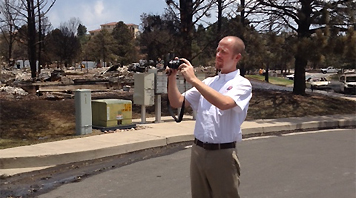|
RMIIA News Releases7951 E. Maplewood Avenue, Suite 110 Contact: Wildfires Explode Across Colorado: Insurance Advice for Residents Evacuated from Their Homes and for Those Returning to Damaged or Destroyed Properties. June 25, 2012 – Colorado's 2012 wildfire season has reached historic proportions—with thousands still in the path of dangerous wildfires and others coping with the aftermath. As Coloradans find themselves at each end of the wildfire spectrum they need to understand how their insurance works. More homes were lost to the High Park Fire over the weekend, while thousands remain evacuated, along with those impacted by the Waldo Canyon Fire in Southern Colorado. Insurance adjusters are beginning to work with residents allowed to return to their homes, but still have limited access to insured properties due to the unpredictability of the High Park Fire. "For those homeowners under new evacuation orders in Southern Colorado, they need to get in touch with their insurance companies to let them know where they are staying and ask about coverage for out-of-pocket expenses," says Carole Walker, Executive Director of the Rocky Mountain Insurance Information Association. "Those residents being allowed back in to the High Park Fire burn areas should contact their insurer if they have damage to set up on-site inspections. With so many structures damaged or destroyed, be aware that serious losses will take priority." Most insurance policies also cover additional living expenses (ALE) if you are unable to live in your house or apartment because of a fire or other covered peril. Most policies will reimburse you the difference between your additional living expenses and your normal living expenses, but do have set limits on the amount they will pay and may be subject to a deductible. There are different time frames and limits associated with additional living expenses, so it is important to keep receipts and check with your company to better understand how your ALE coverage works.
Advice for Filing Insurance Claims Keep in mind that it is a process that needs to be worked through step-by-step, but there is plenty of assistance available to you through your insurance company and other financial service providers. Insurance Claims Settlement Advice: Tips for Selecting a Reputable Contractor Contractor Checklist:
For more consumer information on insurance topics, logon to www.rmiia.org. ### Rocky Mountain Insurance Information Association is a non-profit consumer information organization. Affiliated with the Insurance Information Institute, RMIIA has been serving consumers and the media since 1952. |
|
303-790-0216 • 800-355-9524 • Contact Us • Legal Notice, Disclaimer & Terms of Use
Home • About RMIIA • News Room • P&C Insurance Industry • Auto • Homeowners • Business • Catastrophes • Agent Resources • Events & Education • Brochures

